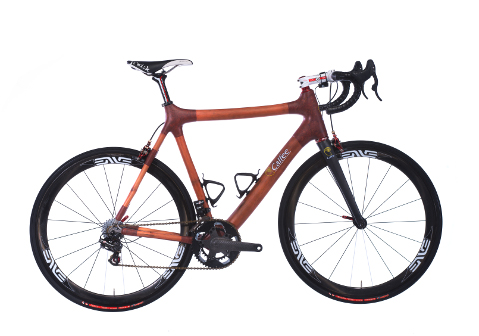The Sustainable Bamboo Bike
Can Environmentally Friendly, Lightweight, and Strong Overcome Skepticism?

From flooring, to clothing, to jewelry, bamboo is being used in the manufacture of a large number of products. The speed at which it grows, the increasing consumer interest in environmentally friendly products, and the relative ease of cultivation have all contributed to a $60 billion global industry. From high-end road bikes to affordable transportation, bamboo bicycles are gaining in popularity, too.
When it came time for Nick Frey to write his Princeton senior thesis, his passion for bikes made the topic selection easy. Frey, who has traveled to 20 countries to compete in biking events, and won two national titles, decided to pair his mechanical and aerospace engineering studies with his love of cycling. He teamed up with two other students to design and build a bike made from bamboo.
“The concept had promise,” Frey says of the school project, so much promise that he has since built a successful company around the idea. He is now the CEO of Boo Bicycles, which will celebrate eight years of operation this summer. “Our mission,” says Frey, “is to create the highest performance, best riding custom bikes on the market using bamboo and other materials.”
Bikes made from bamboo offer some unique advantages. They absorb road vibrations three times better than their carbon fiber counterparts. “This means a rider can pedal longer with less fatigue and feel fresher after a serious number of miles,” says Frey. Bamboo has a greater tensile strength than steel, and while it provides some flexibility, the ride is anything but soft. All of this adds up to bikes that respond “like a top-notch race bike should, with authority and without any loss in power.”
Ultra-endurance athlete Erich Wegscheider got to experience bamboo first hand, as he set off to ride 104 miles in the frigid, predawn mountains of Colorado. He borrowed a Boo hardtail mountain bike to race in the Leadville 100. After covering the course, which gains around 11,000 feet in elevation, in an impressive 8 hours and 43 minutes, he was sold. Says Wegscheider, “Bamboo bikes really are all-rounders: climbing, descending, cornering, and endurance.”

For Craig Calfee, strength and performance have always been at the heart of bike building. Among the very first to create carbon fiber frames in the 1980s, Calfee has been working with bamboo since 1995, when he created a bamboo bike as a marketing tool for his company, Calfee Design. “It was originally a publicity magnet,” says Calfee, who started using the bike to run errands. “The ride quality was so nice that I built more.” Today, Calfee Design offers high-end bikes in both carbon fiber and bamboo, as well as a more affordable DIY kit for cyclists who want to build their own bamboo bike.
One of the main advantages Calfee sees to crafting bamboo bikes is the low barrier to entry. “They can be built with minimal tooling almost anywhere.” For this reason, he has worked to bring them into rural areas of Africa, where bicycles can create vital links to education, health care, and financial opportunity. Calfee is currently partnered with local Congolese builders, working together to create sturdy bamboo cargo bikes.
When heat treated and sealed properly, makers say bamboo bike frames will hold up to heavy use over time, outlasting all of the bike’s components. As a crop, bamboo offers many environmental benefits, requiring no pesticides to grow, yielding large quantities quickly, and emitting 35 percent more oxygen than trees. With so much going for them, perhaps the biggest hurdle in the bamboo bike market is consumer skepticism of the unknown.
Eric Hiller, co-founder of the affordable bamboo bike company Greenstar Bikes, notes that the material is both ancient and innovative. Says Hiller, “In Europe and Asia, they’ve known about bamboo for thousands of years, they still use it for scaffolding to build skyscrapers in parts of Asia.” In the United States, and elsewhere, confidence in the material is slowly growing with greater exposure. Whether bamboo bikes remain a niche market or expand into mainstream cycling may be a matter of consumer perception.



